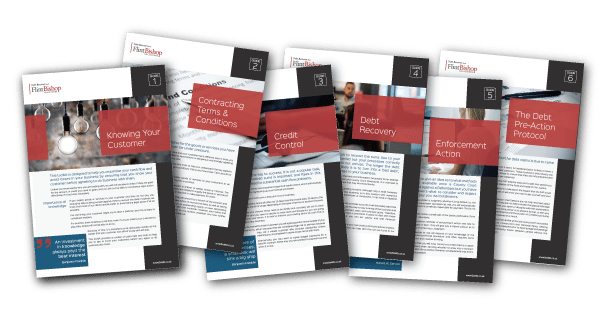The much-feared Pre-Action Protocol (“PAP”) for Debt Claims came into force on 1 October 2017. Were creditors right to fear its introduction? Has it had a huge impact on the recovery of debts from individuals or sole traders?
For those few who may not have not heard of the PAP (where have you been!), it essentially sets out a procedure which any business claiming payment of a debt from an individual (including sole traders) must follow before court proceedings are issued.
The PAP was introduced by Lord Justice Jackson who felt that debtors were not being “fully informed” at the outset of debt claims and could not obtain proper advice.
Pre-Action Protocol summary reminder
In short, the Pre-Action Protocol, amongst other things, obliges creditors pursuing debts from individuals to:
1. Send a more detailed letter before action (LBA) including, amongst other things:
a. A breakdown of the debt
b. The date of the contract with the debtor
c. Details of any assignment of the debt
d. An explanation of how the contract came into being (whether written or verbal) and that a written contract can be provided if requested
e. A Reply Form and Financial Statement Form
2. Allow the debtor 30 days to respond to the LBA before any Court action is taken. However, if the debtor responds to the LBA and sends a completed Reply Form, the creditor should provide the debtor with a further 30 days and if the debtor then requests any documentation another 30 days should be allowed. If a period of negotiation follows the LBA and subsequently no agreement can be reached then the creditor must provide a 14 day period of grace to the debtor before proceedings can be issued.
Why were credit professionals concerned?
In the lead up to the introduction of the Pre-Action Protocol, Flint Bishop was invited to present at various credit events across the UK, to discuss the Pre-Action Protocol, its requirements and ways to limit the impact. The reaction at each presentation was the same; credit professionals were confused about the specifics of the PAP and extremely concerned about the potential impact it would have on their processes and their general ability to recover debts, not to mention the increased administration and paper court costs that could be incurred.
Credit Managers were particularly concerned that some debtors would use it as a way to tactically draw out the debt recovery process for as long as possible and that debtors, as part of this process, would request large amounts of information.
Of course, businesses want to recover their debts as quickly and as effectively as possible. They do not want to have to raid their archives or question their sales individuals about how a contract may have been created (particularly where a contract was created years previously).
So has the Pre-Action Protocol had a detrimental effect on the recovery of debts against individuals and sole traders?
Of all the Pre-Action Protocol compliant LBAs that we have sent since 01 October 2017, we have only had a response rate of 7%. All these responses have resulted in instalment proposals or settlement offers being made. Interestingly, none of the debtors, who have been sent a PAP compliant LBA, have returned a completed reply form; they have instead chosen to call. The idea that debtors need to be sent a large wad of paper to enable them to respond appears, at this stage, entirely misconceived. Trees will suffer in vain, it seems.
Whilst a 7% response rate to a pre-PAP LBA may appear to be a poor response rate, post-PAP it simply means that after 30 days our clients are free to issue proceedings on 93% of their debtors who have been sent a Pre-Action Protocol compliant letter. It would seem that Credit Manager’s worst fears of debtors elongating the recovery process to 60 or 90 days have not yet materialised. Our experience to date suggests that the PAP is not encouraging early engagement as was intended. Could it be that Lord Justice Jackson’s view of debtors and their reasons for not responding was somewhat idealistic?
The recently published Court statistics tell their own story of the initial impact of the Pre-Action Protocol. In Q4 of 2017, the volume of money claims issued was down by 17% and judgments were down by 8%. The MOJ has stated in its quarterly report that:
“The decrease in specified money claims has been driven by the implementation of the Pre-Action Protocol for Debt Claims, which was introduced in October 2017. The main aim of the protocol is to encourage early engagement between parties to resolve disputes without needing to start court proceedings.”
Our experiences suggest that the objective of early engagement may be somewhat illusory, but on face value, the reduction in claims would appear to indicate the successful objective of reducing Court use. That said, a cynic may consider that this reduction is more about placing additional hurdles in the way of businesses trying to collect their debts than it is about any genuine expectation of early engagement.
Of course, it is still early days and it may be that many debtors are still not fully aware of how the Pre-Action Protocol works and are not yet using the PAP to their advantage (or at all). For now, it would seem that for those businesses that were suitably prepared, this is not the nightmare that everyone expected it to be. In fact, on current evidence, it looks as though the PAP will be thoroughly pointless in the vast majority of cases.
|
“UK Mail was concerned about the impact that the Pre-Action Protocol would have on its business and in particular its cash flow. In the run-up to the PAP Flint Bishop provided us with training and useful advice as to what we could do to lessen the impact of the PAP. Consequently, we have found that the PAP has had relatively little effect upon us. Flint Bishop devised a bespoke debt recovery package for UK Mail which means that our debts are being recovered often without the need to resort to the PAP.” Jason Sheffield, |
For more information, please contact us on 01332 226 474 or email: .
|



